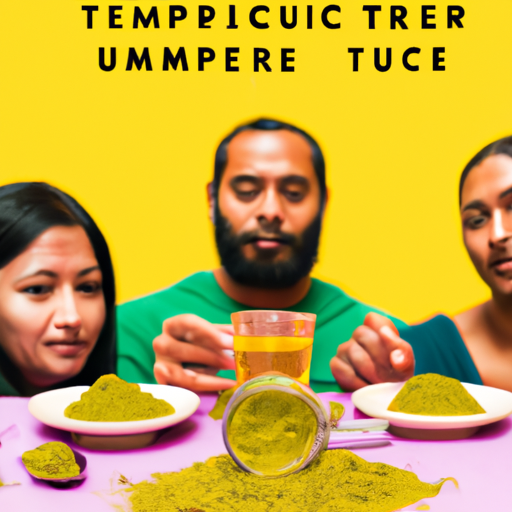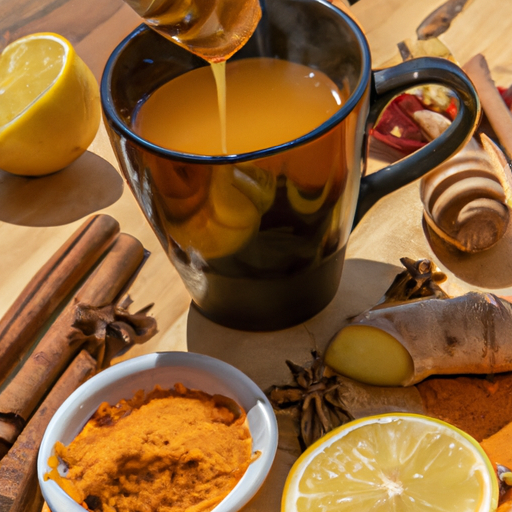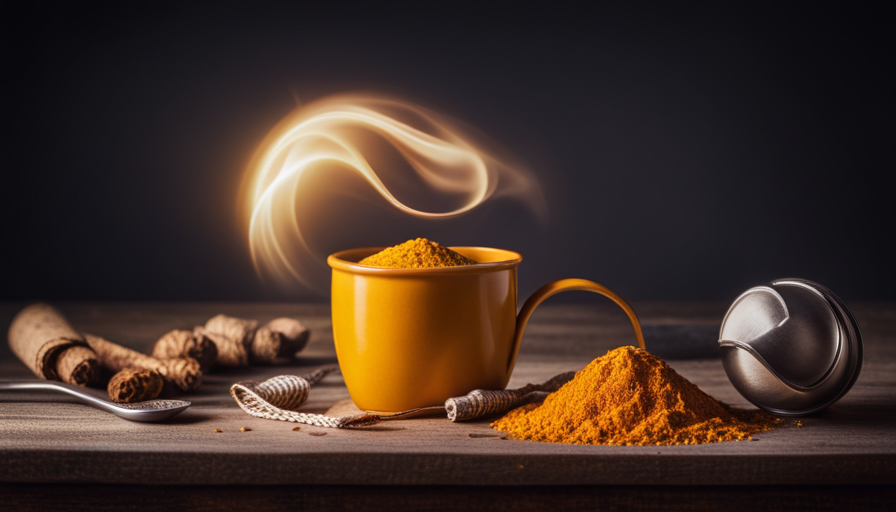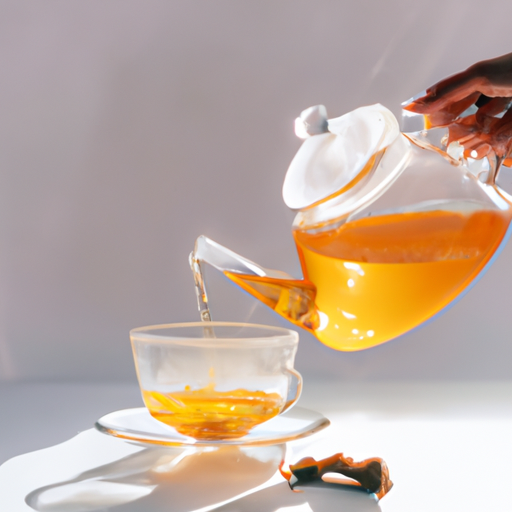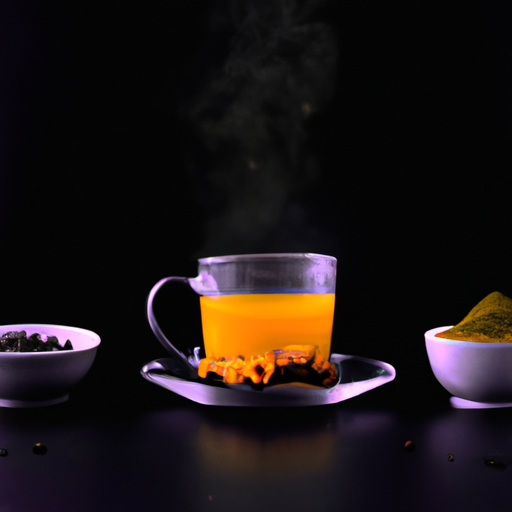Coincidentally, I was recently introduced to the wonders of turmeric tea. As I began researching its benefits, I was amazed by its potential to boost immunity, reduce inflammation, and improve digestion. However, it is important to note that turmeric tea is not suitable for everyone. Certain individuals should avoid consuming this beverage due to potential health risks.
In this article, we will explore who cannot drink turmeric tea.
- If you have gallbladder issues, stomach ulcers, or are taking specific medications, turmeric tea may not be suitable for you.
- Pregnant or breastfeeding women should also exercise caution, as there is limited research on the effects of turmeric on fetal development.
- Individuals with allergic reactions to turmeric or those with iron deficiency should avoid consuming this tea.
- Lastly, children and infants are not recommended to drink turmeric tea due to its potential impact on their developing bodies.
It is crucial to prioritize your health and make informed decisions about what you consume. By understanding who cannot drink turmeric tea, you can ensure that you are taking care of your well-being in the best possible way.
Key Takeaways
- Individuals with gallbladder issues should avoid turmeric tea.
- Patients with stomach ulcers should avoid turmeric tea.
- Individuals on specific medications such as blood thinners, statins, and NSAIDs should avoid turmeric tea.
- Pregnant or breastfeeding women should avoid turmeric tea, as it may affect fetal development and breastfeeding infants.
Individuals with Gallbladder Issues
Individuals with gallbladder issues shouldn’t consume turmeric tea due to its potential to stimulate bile production, which may exacerbate their symptoms. Maintaining gallbladder health is crucial for proper digestion, and any disruption to its function can lead to discomfort and digestive problems.
Turmeric tea has been praised for its numerous health benefits, including its anti-inflammatory properties and ability to aid digestion. However, for those with gallbladder issues, the active compound in turmeric called curcumin can stimulate the production of bile, which may worsen their symptoms.
The gallbladder plays a vital role in digestion by storing and releasing bile, a substance that helps break down fats. When the gallbladder is not functioning properly, it can result in the formation of gallstones or a condition known as cholecystitis, which is inflammation of the gallbladder. Consuming turmeric tea in such cases can potentially increase the production of bile, putting additional strain on the already compromised gallbladder.
Moving on to people with stomach ulcers, it’s important to note that turmeric tea may not be suitable for them either.
People with Stomach Ulcers
If you have stomach ulcers, you should steer clear of this soothing beverage. Stomach ulcers are painful sores that develop on the lining of the stomach, and they can be aggravated by certain foods and drinks. While turmeric tea has several health benefits, it may not be suitable for individuals with stomach ulcers.
Stomach ulcer treatment: Stomach ulcers can be treated with medications like proton pump inhibitors (PPIs) or H2 blockers, which reduce the production of stomach acid. These medications help in healing the ulcers and relieving symptoms such as stomach pain and indigestion.
Turmeric tea benefits: Turmeric contains a compound called curcumin, which has anti-inflammatory and antioxidant properties. It has been found to have potential health benefits, such as reducing inflammation, improving digestion, and boosting the immune system. However, there is limited scientific evidence specifically regarding the effects of turmeric tea on stomach ulcers.
Precautions: Turmeric is known to stimulate the production of stomach acid, which can irritate the stomach lining and worsen the symptoms of stomach ulcers. Additionally, curcumin can interfere with the action of certain medications, including blood-thinners and acid-reducing drugs.
Moving forward to individuals taking specific medications, it’s important to consider how turmeric tea may interact with their prescribed treatments.
Individuals Taking Specific Medications
Steer clear of this soothing beverage if you’re on certain medications, as it could potentially interfere with your prescribed treatments. Turmeric tea has been found to interact with blood thinners, such as warfarin, increasing the risk of bleeding. This is due to the fact that turmeric contains compounds called curcuminoids, which have anticoagulant properties. If you’re taking blood thinners, it’s important to consult with your healthcare provider before consuming turmeric tea.
In addition to its potential interactions with blood thinners, turmeric tea may also pose a risk of liver damage for individuals taking specific medications. Certain medications, such as statins and nonsteroidal anti-inflammatory drugs (NSAIDs), can already place a burden on the liver. Adding turmeric tea to the mix may further strain the liver and potentially lead to liver damage.
To help you understand the potential interactions between turmeric tea and specific medications, here is a table outlining some common medications and their potential effects when combined with turmeric tea:
| Medication | Potential Interaction |
|---|---|
| Blood Thinners | Increased risk of bleeding |
| Statins | Potential liver damage |
| NSAIDs | Potential liver damage |
| Antacids | Reduced absorption of turmeric’s active compounds |
Moving forward, let’s explore how turmeric tea can affect pregnant or breastfeeding women.
Pregnant or Breastfeeding Women
I must note that there’s a lack of research on the safety of turmeric tea during pregnancy and breastfeeding. It’s important to consider potential risks to the fetus or infant before consuming turmeric tea in these situations. More studies are needed to determine the effects and possible risks associated with turmeric tea for pregnant or breastfeeding women.
Lack of research on the safety of turmeric tea during pregnancy and breastfeeding
While there’s limited research on the safety of turmeric tea during pregnancy and breastfeeding, it’s still advised to consult with a healthcare professional before consuming it. Safety concerns and potential health risks arise due to the lack of concrete evidence regarding its effects on pregnant women and their developing fetuses, as well as breastfeeding infants.
Turmeric contains compounds called curcuminoids, which are known for their anti-inflammatory and antioxidant properties. However, these compounds may also have the potential to stimulate the uterus or affect hormonal balance, which could pose risks during pregnancy.
Additionally, the effects of turmeric tea on breast milk production and the infant’s health are still uncertain. Therefore, it’s crucial to seek guidance from a healthcare provider to ensure the safety of both the mother and the baby.
Potential risks to the fetus or infant
Be cautious of the potential harm that could come to your developing baby if you consume turmeric tea without consulting a healthcare professional. While turmeric tea can have many benefits for digestion, it’s important to consider its effects on your baby.
Limited research exists on the safety of turmeric tea during pregnancy and breastfeeding, so it’s crucial to seek expert advice. Turmeric contains compounds that may stimulate digestion, but it can also affect liver health. This is particularly important during pregnancy, as the liver plays a vital role in metabolizing substances that enter the body.
Therefore, it’s recommended to consult with a healthcare professional to assess the potential risks and benefits of consuming turmeric tea during this crucial time.
Moving forward, let’s now discuss people who may have allergic reactions to turmeric.
People with Allergic Reactions to Turmeric
People who have allergic reactions to turmeric might want to avoid turmeric tea. Turmeric allergy symptoms can range from mild to severe and can include skin rashes, itching, swelling, and difficulty breathing. It’s important to note that turmeric allergies are relatively rare, but if you suspect you have an allergy, it’s best to avoid consuming turmeric in any form, including turmeric tea.
For individuals who are allergic to turmeric, there are alternatives to turmeric tea that can provide similar health benefits. Ginger tea, for example, has anti-inflammatory properties and can help with digestion, just like turmeric tea. Chamomile tea is another option that can help with relaxation and reducing inflammation. Additionally, green tea is known for its antioxidant properties and can be a good alternative for those who can’t consume turmeric.
Moving on to individuals with iron deficiency, it’s important to note that turmeric can inhibit the absorption of iron in the body. This means that individuals with iron deficiency might want to avoid consuming turmeric tea, as it may further decrease their iron levels. Instead, they can explore other herbal teas or consult with a healthcare professional for alternative ways to increase their iron intake.
Individuals with Iron Deficiency
As someone with iron deficiency, it’s important to be aware of the potential effects of turmeric on iron absorption. Turmeric has been found to inhibit the absorption of iron in the body, which could further worsen iron deficiency anemia.
It is recommended to consume turmeric in moderation or consult with a healthcare professional to ensure that you’re getting adequate iron while still enjoying the benefits of turmeric.
Turmeric’s inhibitory effect on iron absorption
Despite its many health benefits, turmeric tea can put a damper on your iron absorption. It acts as a sneaky thief that pilfers your body’s essential nutrients. Research suggests that turmeric’s impact on gut health and inflammation levels can hinder the absorption of iron in the body. Turmeric contains compounds called polyphenols that’ve been found to interfere with the absorption of non-heme iron, the type of iron found in plant-based foods and supplements. This can be particularly concerning for individuals with iron deficiency, as their bodies already struggle to absorb enough iron. Therefore, consuming turmeric tea may potentially worsen iron deficiency anemia. It’s important for individuals with low iron levels to be mindful of their turmeric intake and consider consulting with a healthcare professional to ensure adequate iron absorption.
Potential worsening of iron deficiency anemia
Beware of turmeric’s impact on iron deficiency anemia as it worsens the condition by hindering iron absorption, leaving your body deprived of essential nutrients. When suffering from iron deficiency anemia, it is crucial to be aware of dietary modifications that may worsen symptoms. Turmeric, a popular spice known for its health benefits, can actually hinder iron absorption, making it problematic for individuals with iron deficiency anemia. This means that consuming turmeric tea or other turmeric-containing foods may further deprive the body of the necessary iron it needs to function properly. To illustrate the impact of turmeric on iron absorption, consider the following table:
| Food Item | Iron Content (mg) | Turmeric Content |
|---|---|---|
| Spinach | 2.7 | None |
| Chickpeas | 2.9 | None |
| Spinach Curry | 2.7 | 1 tsp |
As you can see, even a small amount of turmeric can potentially interfere with iron absorption. In the next section, we will explore the implications of turmeric consumption on children and infants.
Children and Infants
Children and infants should avoid drinking turmeric tea as it may cause stomach upset and allergic reactions, such as rashes or difficulty breathing. While turmeric tea is known for its numerous health benefits, including its anti-inflammatory and antioxidant properties, it isn’t recommended for young children and infants.
Turmeric tea is made by boiling turmeric powder or grated turmeric root in water. It’s often consumed for its potential health benefits, such as reducing inflammation, boosting the immune system, and improving digestion. However, these benefits may not outweigh the potential risks for children and infants.
Studies have shown that turmeric can cause gastrointestinal issues, such as stomach upset and diarrhea, especially in young children with sensitive stomachs. Additionally, some children may be allergic to turmeric, leading to skin rashes or difficulty breathing. These allergic reactions can be severe and require immediate medical attention.
It’s important to note that there’s limited research on the effects of turmeric tea specifically in children and infants. Therefore, it’s best to err on the side of caution and avoid giving turmeric tea to young children and infants, especially if they have a history of stomach issues or allergies.
Frequently Asked Questions
Can individuals with gallbladder issues drink turmeric tea?
Individuals with gallbladder issues should exercise caution when consuming turmeric tea. While it is generally safe, high doses may contribute to gallstone formation. It is best to consult with a healthcare professional for recommended dosage and potential side effects.
Is it safe for people with stomach ulcers to consume turmeric tea?
When it comes to individuals with stomach ulcers, it is important to take safety precautions before consuming turmeric tea. Studies have shown potential side effects such as increased stomach acid and irritation.
Are there any specific medications that should be avoided while drinking turmeric tea?
Some medications may interact with turmeric tea, potentially causing side effects. It is important to consult with a healthcare professional before consuming turmeric tea if you are taking any medications.
Can pregnant or breastfeeding women drink turmeric tea?
Pregnant or breastfeeding women should consult with their healthcare provider before consuming turmeric tea. While it has many benefits like reducing inflammation and boosting immunity, it’s important to ensure safety for both the mother and baby.
What should people with allergic reactions to turmeric do if they accidentally consume turmeric tea?
If I accidentally consume turmeric tea and have allergic reactions to turmeric, I should seek medical attention immediately. There are no alternative remedies for turmeric allergies, so it’s important to consult a healthcare professional for proper guidance and treatment.
Conclusion
In conclusion, it’s crucial to consider the contraindications of turmeric tea before indulging in its golden goodness. Individuals with gallbladder issues, stomach ulcers, or those taking specific medications shouldn’t steer clear. Pregnant or breastfeeding women, as well as those with allergic reactions to turmeric, should also exercise caution.
Additionally, individuals with iron deficiency and children or infants should avoid this vibrant elixir. Remember, it’s essential to prioritize your health and consult a healthcare professional if unsure. Sip smartly, stay safe, and let turmeric’s tantalizing taste tantalize your taste buds no more.

